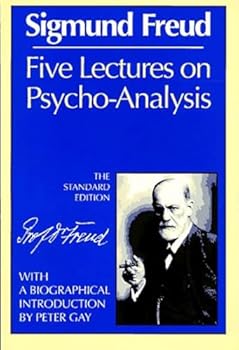Five Lectures on Psycho-Analysis (Complete Psychological Works of Sigmund Freud)
Select Format
Select Condition 
Book Overview
Freud approved the overall editorial plan, specific renderings of key words and phrases, and the addition of valuable notes, from bibliographical and explanatory. Many of the translations were done by... This description may be from another edition of this product.
Format:Paperback
Language:English
ISBN:0393008479
Release Date:April 1990
Publisher:W. W. Norton & Company
Length:112 Pages
Weight:0.80 lbs.
Dimensions:7.8" x 0.4" x 5.3"
Customer Reviews
3 ratings
Great Intro to Freud
Published by Thriftbooks.com User , 16 years ago
Yes, this little book, that you could read in a half a day, is a fantastic introduction to Freud's oeuvre. Here, he simply and, at times, humorously lays out his general theories to a lay audience at Clark University. Freud has a bad wrap with most people here in the States, and surely this is do to Psych 101 classes. But I suggest to anyone, give this man the benefit of the doubt. In this book you quickly learn that his anecdotes are fun, excellent and one could only imagine that he was an engaging lecturer.
Lectures on repression; its analysis and relation to erotism
Published by Thriftbooks.com User , 21 years ago
In this study Freud delves into the studies of psycho-analysis and prepares a prognosis that stipulate his observations. He confesses that this series of lecture are not the entire studies of psycho-analysis but provide just a glimpse into the subject. In the Study of Hysteria: hysterical patients have been noted to suffer from prior reminiscences. Their symptoms are residues and mnemonic symbols of particular traumatic experiences. Not only do the patient remember the painful experiences of the remote past; but they still cling to them emotionally; they cannot free themselves of the past and for its sake they neglect what is real and immediate. The fixation of this mental life to pathogenic traumas is one of the most significant and practically important characteristics of neurosis. Typically in the pathogenic situations; the patient is emotionally overwhelmed and is obliged to suppress a powerful instead of allowing its discharge in the appropriate signs of emotions, words or actions. One is driven to assume that the illness occurred; because the affects generated in the pathogenic situations had their normal outlet blocked and the essence of the illness lay in the fact that these `strangulated' affects were then put to an abnormal use. In short they remained a permanent burden upon the patient's mental life and a source of constant excitation for it. Freud disagrees with Pierre Janet's thesis that hysterical patients; are inherently incapable of holding together the municipality of mental process into a unity; arises the tendency of mental dissociation. Janet in his experiments showed that in hypnosis the lapses of the supposed lost memories could be brought back. On the contrary Freud suggests that forgotten memories were not lost. They were in the patient's possession and were ready to emerge in association to what was still known by him; but there was some force that prevented them from becoming conscious and compelled them to remain unconscious. The force that was maintaining this the pathological condition became apparent in the form of resistance on the part of the patient.What Freud has found out about pathogenic complexes and repressed wishful impulses of neurotic traces back the symptoms of the patients' illness with really surprising regularity to impression from their erotic life. Even before puberty extremely energetic repression's of certain instincts have been effected under the influence of education, and mental forces such as shame, disgust and morality have been setup, which like watchmen, maintain these repressions. So that when at puberty the high tide of sexual demands is reached, it is met by these mental reactive or resistant structures like dam, and make it impossible for it to reactivate the instincts that have undergone repression.
one of Freud's clearest reads
Published by Thriftbooks.com User , 24 years ago
These lectures to a lay audience are a good starting point for understanding Freud's thought--very readable, informative, and at times humorous.






